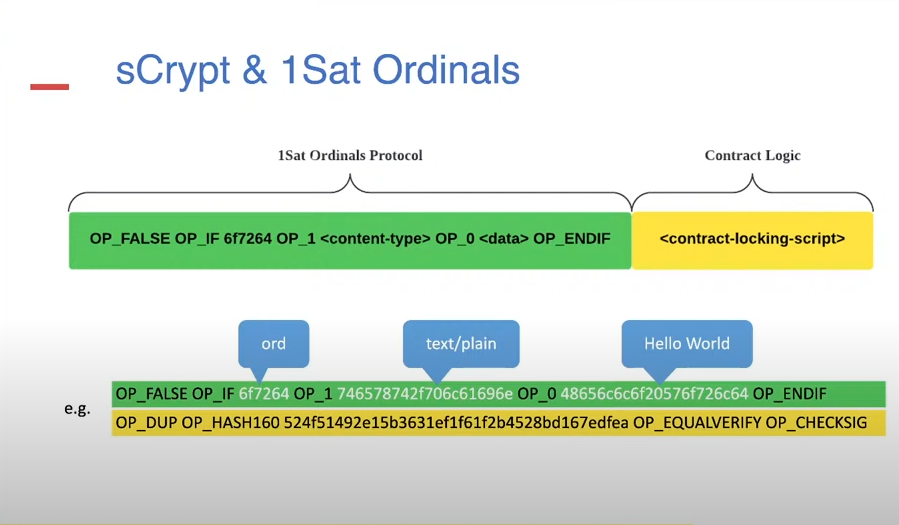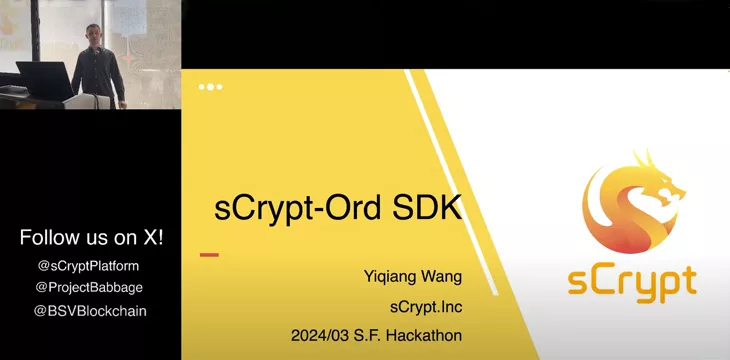|
Getting your Trinity Audio player ready...
|
Would you like to create NFTs or fungible tokens for a game, DeFi app, or collectible series? BSV’s 1Sat Ordinals makes this cheap and easy. If you’d like to make that even simpler, sCrypt now has an SDK for developers that allows them to manage complex rules for token use without needing to learn a new programming language. sCrypt co-founder Yiqiang Wang demonstrated the SDK at the recent sCrypt Hackathon 2024 kickoff event in San Francisco.
We looked at Ordinals and 1Sat Ordinals NFTs in the hackathon’s afternoon session. Wang goes into more detail about why BSV’s 1Sat Ordinals protocol is superior to the Ordinals protocol on BTC. Both are identical in concept (they inscribe unique data on a single Bitcoin Satoshi unit). However, 1Sat Ordinals only have a single Satoshi in the transaction output, while BTC Ordinals require about 546 Satoshis due to higher network costs. 1Sat Ordinals also feature origin-based indexing and inscribing in transaction outputs—both make keeping track of the tokens more efficient and straightforward.
The full afternoon session of Day One is available at this link, and you can catch the entire two-day series of sCrypt Hackathon 2024 presentations on the CoinGeek YouTube channel. The presentations tackle the blockchain’s basic features before getting into more technical detail about how sCrypt’s TypeScript-based environment makes it easier for developers to turn their visions into working products.
The sCrypt SDK for Ordinals
So how is sCrypt making Ordinals easier for developers? In this presentation, Wang introduces the company’s Ordinals SDK. Think of sCrypt contracts as “token control logic,” while the code is written in TypeScript initially, it compiles into Bitcoin native script to work on Layer 1. The 1Sat Ordinals token protocol represents the token, while sCrypt’s contract logic defines it, setting rules for managing and controlling it.

“Manage and control” means keeping track of unique NFTs, who owns them, and what can be done with them (and when and by whom). Since the contract logic is decoupled from the code representing the token itself, it can be transferred from one contract to another one with different rules, all defined by the contract’s creator.
“That will bring us a wonderful future because we can do whatever we want in the future with a token we can issue now,” Wang said. “When we add 1Sat tokens with sCrypt we can get infinite possibilities to create future apps.”
The sCrypt 1Sat Ordinals SDK is a JavaScript library that supports both fungible and NFT types. It allows effortless integration between the 1Sat Ordinals protocol and sCrypt’s libraries and has a dedicated provider to submit information to indexers.
Wang then demonstrates code examples to perform NFT-related functions like inscribing text/images, hash-locking, and transfer, which developers can use without needing to reproduce the complex native code required to turn these into Bitcoin transactions.
The BSV-20 sub-protocol is for fungible tokens (which are also Ordinals), and sCrypt’s SDK can handle these too. Fungible tokens are tokens that form part of an identifiable class but don’t need to be individually unique—think of the dollars in your bank account as an example. However, they still need a set of rules to operate and for the blockchain to track them all.
sCrypt has also created a fully functional web app to demonstrate how easy it is to mint an existing token using 1Sat Ordinals or deploy a new one. You can try it for yourself here. There’s also a plugin for the WhatsOnChain blockchain explorer, where you can view the details of a token from its related transactions.
If you’re a developer and all this sounds interesting, check out the other Hackathon presentations or take a look at sCrypt’s body of work. If you miss out on participating in the 2024 Hackathon, sCrypt’s website is open any time as a resource for people to learn more.
Watch: Tokens on Bitcoin? One Sat Ordinals and sCrypt

 02-17-2026
02-17-2026 




